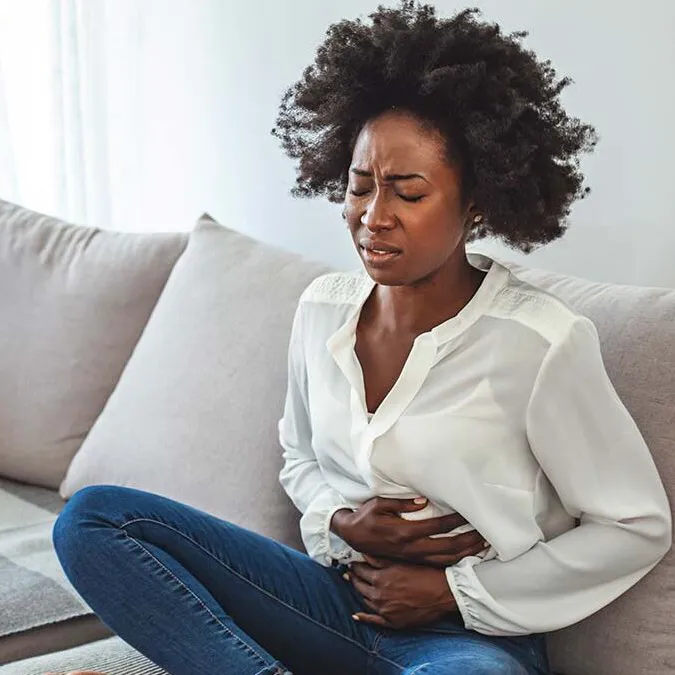
Published on: 15 March, 2021
Read Time: 4 min
Vaginal discomfort is a general term that refers to any condition that causes itchiness, irritability or pain in the vagina. There are numerous causes of vaginal discomfort and most women will have at least one experience of this condition over the course of their lives.
Discussed below is a brief overview of the signs and symptoms of vaginal discomfort and how to deal with them.
Symptoms that may be associated with vaginal discomfort
- Vaginal itching
- Vaginal odor
- Abnormal vaginal discharge
- Painful sex
- Vaginal dryness
Common causes of vaginal discomfort
- Vaginitis
- Bacterial vaginosis
- Candidiasis
- Atrophic vaginitis (specifically related to menopause and low estrogen levels)
- Anogenital pruritus
- Pruritus vulvae
Vaginitis
Vaginitis occurs when the vagina or vulva have an infection or irritation. This disruption in the normal environment of the vagina leads to some of symptoms that are experienced.
- Symptoms of vaginitis:
- Vaginal discharge
- Vaginal itching, burning
- Pain with sexual intercourse
- Painful urination
Vaginitis has both infective and non-infective causes. For a majority of affected women, vaginitis is caused by: Bacterial vaginosis, yeast (candidiasis) infections and trichomoniasis, a sexually transmitted infection.
- Bacterial vaginosis – a condition that results from a change of the normal bacteria found in the vagina. Essentially, good bacteria in the vagina are overgrown by bad bacteria. In addition to the symptoms mentioned above, discharge of bacterial vaginosis appears thin white or gray. Bacterial vaginosis may resolve on its own or require antibiotics.
- Yeast infections – these are usually caused by a naturally occurring fungus called candida albicans. A vaginal yeast infection is a fungal infection that causes irritation, discharge (appears as thick, white clumps) and intense itchiness of the vagina and the vulva. Treatment for a yeast infection can be sought by using over the counter medications that are available at most pharmacies.
- STI – STI’s such as Trichomoniasis may also cause vaginitis or irritation of the vagina.
Atrophic vaginitis
Atrophic vaginitis or vaginal atrophy is thinning, drying and inflammation of the vaginal walls that occurs when the body starts to lose estrogen. Vaginal atrophy occurs most often after menopause. Because the condition causes both vaginal and urinary symptoms, doctors may use the term “genitourinary syndrome of menopause” (GSM) to describe the same issue.
Symptoms of vaginitis
- Painful intercourse
- Genital itching
- Burning with urination
- Urgency with urination
Diagnosis and treatment
A large number of postmenopausal women will experience atrophic vaginitis. Unfortunately many do not seek help because they believe these symptoms are just a normal part of aging. However, such symptoms, especially those that interfere with any aspect of your life should always be discussed with your doctor. Treatments may include a combination of estrogen creams, lifestyle changes or HRT.
Anogenital pruritus
A condition that is defined by intense itching that affects the anal and perianal area. Although women of any age may be affected, it is most commonly seen in postmenopausal women due to loss of estrogen.
Causes
- Infection
- Allergic reaction or an irritation to soaps, douches or perfumes
- Candidiasis (yeast infection)
- Underlaying medical condition – ie. psoriasis, lichen simplex chronicus
Treatment and diagnosis
Diagnosis of anogenital pruritis may or may not require formal diagnostic tests. This will depend on the history and examination carried out by your doctor. Treatment options may involve ointments, steroid creams or medications aimed at treating the underlaying cause.
Pruritus vulvae
‘Pruritus vulvae’ simply means itching of the vulva. The vulva is the area of skin just outside the vagina. In women, pruritus vulvae does not usually involve the anal area, although itching usually spreads to the vulva. The itching of pruritus vulvae is persistent and may cause distress.
An itchy vulva is a symptom, not a condition in itself. Causes of pruritis valvae include thrush infections, STI’s or irritation due to soaps or perfumes. Treatment for pruritus vulvae will depend on the underlying cause.





